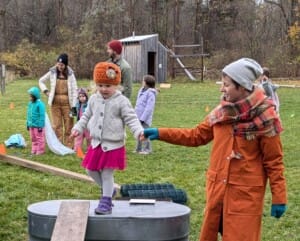 The whining of young children, much like the crying of a baby, is meant to cause us distress, simply because the survival of our species one time depended on our responsiveness. But when our children are frustrated with a task, how we respond is communication about how we view our child. We need to ask ourselves if we are communicating trust in their competence because part of resilience is how we view ourselves.
The whining of young children, much like the crying of a baby, is meant to cause us distress, simply because the survival of our species one time depended on our responsiveness. But when our children are frustrated with a task, how we respond is communication about how we view our child. We need to ask ourselves if we are communicating trust in their competence because part of resilience is how we view ourselves.
Parents admitted that it is hard to resist jumping in to fix things when their child is struggling. We might just grab the front of the shirt they are wearing and button the buttons ourselves when our child whines about how difficult they are. Later in life, we might jump in to call the school when our child struggles with a peer or teacher, or jump in the car to bring their forgotten assignment.
This is all part of our urge to care for our child and I would never tell parents not to help their children. Parents need to be advocates for their children. But we also need to be sure we are not robbing our child of opportunities to face difficulties and in turn grow their own sense of competence – which leads to resilience. During our discussion, the parents had several good suggestions for phrases.
When a child expresses frustration with a difficult task:
- What do you need right now?
- Show me what you are trying to do.
- Do you need help?
As a Montessorian, I suggest to parents that they help SLOWLY when they do help: To move slowly when assisting a young child to zip a coat so that they are motivated to grab it back and try again; and to build in delays when helping an older child: “Yes, but I need to finish this first so it will take a little while…”
The lack of urgency both allows the child time to calm themselves and put in effort or jump in to participate when they have support, and it also communicates that the adult believes the child is capable. A favorite line I often used in the primary classroom when children asked for help was: “I can help, but I will not do it for you – you have to help too.” It is a good line for parents as well, and a good reminder to include our child when you are helping them.
With older children who begin to share difficulties with peers or situations at school verbally, we collectively came up with some lines to use that help communicate trust in a child’s competence:
- Do want me to just listen, or do you need my help/suggestions/advice?
- Why do you think that happen?
- What did you do when that happened?
While every story of injustice that comes home may make us want to storm into the school, make an angry phone call, or even berate our child for their involvement, we communicate more trust in their competence when we just listen and do not rescue or judge. And we build a relationship that is more likely to stay open and honest. Children begin to censor themselves when they fear an adult will overreact, OR they may focus more on every difficult interaction in order to engage their caregiver’s full attention! Either way, their developing resilience is affected.


 When facilitating the development of resilience in our children, I encouraged parents to think small and start with how they face daily life challenges. How do we model facing a huge pile of dishes, cooking dinner that the children will likely complain about, getting through the bags of laundry, or organizing our schedules when a car breaks down, and does our modelling encourage interest and participation from our children? Are we making the effort to meet the daily struggles of life at all appealing?
When facilitating the development of resilience in our children, I encouraged parents to think small and start with how they face daily life challenges. How do we model facing a huge pile of dishes, cooking dinner that the children will likely complain about, getting through the bags of laundry, or organizing our schedules when a car breaks down, and does our modelling encourage interest and participation from our children? Are we making the effort to meet the daily struggles of life at all appealing? The whining of young children, much like the crying of a baby, is meant to cause us distress, simply because the survival of our species one time depended on our responsiveness. But when our children are frustrated with a task, how we respond is communication about how we view our child. We need to ask ourselves if we are communicating trust in their competence because part of resilience is how we view ourselves.
The whining of young children, much like the crying of a baby, is meant to cause us distress, simply because the survival of our species one time depended on our responsiveness. But when our children are frustrated with a task, how we respond is communication about how we view our child. We need to ask ourselves if we are communicating trust in their competence because part of resilience is how we view ourselves.